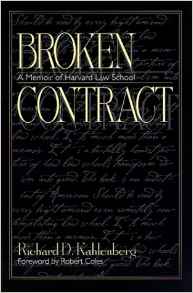Harvard Lawyers

When the author of "Broken Contract: A Memoir of Harvard Law School" began the study of law, his goal was to pursue a career as a public-interest practitioner. He was part of what could be described as an epidemic of idealism among his Crimson classmates who graduated in 1989, 70 percent of whom told a pollster they wanted to do the exact same selfless thing.
Three years later, the epidemic would have run its course. Another study of HLS graduates indicated that just 2 percent actually had gone into public-interest law. The vast majority had opted for the high-status track: giant corporate law firms, starting salaries of $65,000, and defending needy Fortune 500 clients. They had joined the 90 percent of American lawyers who defend 10 percent of the population.
"How is it," asks Richard Kahlenberg of his alma mater, "that so many students can enter law school determined to use law to promote liberal ideals and leave three years later to counsel the least socially progressive elements of our society?" In effect, the author accuses Harvard Law School of being the cure for idealism.
Kahlenberg's disaffection began early. He was the first person to field a Socratic inquiry in the very first class, which brings one notoriety on campus the way surviving a lightning bolt does. Mind you, the inquisitor was not Professor Kingsfield from "The Paper Chase," but the result was a bumbling humiliation for the terrified student just the same.
Much like the army, law school breaks down its recruits, the author insists. Bright, young, hard-working scholars soon learn that they are dunces when it comes to the peculiar requirement of legal reasoning. When high-powered attorney Alan Dershowitz tells them, "The job of the defense lawyer is usually to keep the truth from getting out," many find it difficult to swallow. Law and justice, it seems, are not synonymous.
After several years of having their illusions and their confidence punctured, Kahlenberg's classmates shamelessly embrace the emissaries of giant law firms who come a-courting. It may not be the money that is seductive so much as it is the fact that someone thinks these Crimson dunces are actually worth wining and dining. Much of the tension of this engaging memoir is: Will Kahlenberg cave and go corporate? After all, he is married and, by his final year, has a child. Glumly, he interviews with dozens of large legal factories and gets several solid offers.
The author is a capable and lively story teller, although many of his revelations are hardly new. A 1991 book on the Yale Law School - a smaller, less compulsive institution which HLS students like Kahlenberg view from afar as a virtual nirvana - covered much of the same ground.
In addition, the author may be too quick to fault his alma matter. At one point he blames it for being a prime reason Michael Dukakis (HLS '60) lost the 1988 election, a loose supposition that surely wouldn't stand up in court. Still, this book is a handy and reliable guide to the question: How do lawyers get that way?